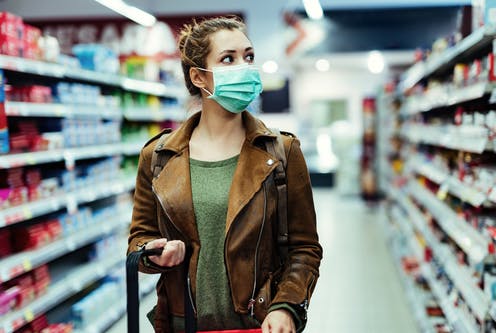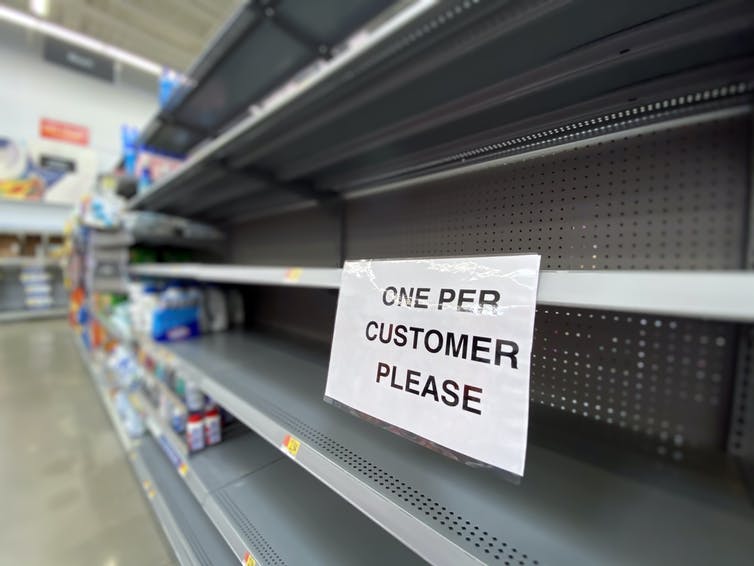
Drazen Zigic/Shutterstock
Despite the UK being one of the most developed countries in the world, there are still thousands of people in Britain who are not able to afford or access period products or menstrual health services – what’s known as “period poverty”. The pandemic has only made this worse.
When the UK entered its first lockdown in March 2020, all “non-essential” workplaces were closed. This included many places that had been providing free period products, education and healthcare for those experiencing period poverty, including schools.
Shortly afterwards, children’s charity Plan International UK released a report showing the impact that this was having. It highlighted how the closure of support services and stockpiling was making it more difficult for people to find tampons, pads and other period products that were affordable.
Our team then conducted research to see how things evolved from this point. Over 18 months (July 2020 to December 2021), we collected data from 34 UK services providing period products, menstrual health education or menstrual health support to find out how they adapted. We also surveyed 240 people across the UK who had experienced period poverty during the pandemic to find out how they had been affected. Here’s what we found.
Where did all the period products go?
Access to period products did indeed become more of a problem during lockdown, with our findings echoing what had previously been reported by Plan International UK and the media. Of the people we surveyed, 85% had experienced difficulties accessing products during lockdown. This lack of products was at the heart of most people’s experiences of period poverty.
But this wasn’t just because they couldn’t afford them. The people we spoke to also couldn’t find products in the places they usually got them from. Places that had provided free products, like schools, were closed, and shops and supermarkets were running out of affordable options.

Orlowski Designs LLC/Shutterstock
Period poverty services also told us of how “new groups” needing help getting products had appeared because of the pandemic. NHS staff were contacting services for products as their workplaces didn’t provide them during long shifts. People who had lost their jobs or been furloughed now needed support because they couldn’t afford products. And period products were often missing in packages provided by food banks or for clinically extremely vulnerable people that couldn’t leave their houses during lockdown.
To meet this increase in demand, new ways of providing products appeared. Period poverty services created “take what you need” boxes, which offered products for free in public places. They also started doorstep deliveries or posting products to people’s home addresses, while social media and community groups communicated where people could get products from.
Support services found that connecting with and supporting new groups and communities was actually a huge benefit of lockdown, and many of the solutions they came up with during the restrictions were kept up after they lifted. Services supporting schools told us that a particular positive was the opportunity to promote reusable period products, with requests for these increasing during lockdown.
But it’s not just about products
Services also told us that plenty of people contacted them for menstrual health advice during lockdown, in the absence of easily accessible healthcare. We were told how accessing GP appointments had become difficult and that people felt they shouldn’t “bother” their doctors about their menstrual health, as it wasn’t as important as COVID.
Of the people we spoke to who had experienced period poverty during lockdown, 75% stated they had needed support or advice about their menstrual cycle while restrictions were in place. Yet only 20% actually sought support from a medical professional. Some didn’t have access to safe and private spaces to be able to attend online or telephone appointments with their GP but were offered no alternative form of consultation.
This highlights that during the pandemic, as in times beforehand, period poverty has been about more than just period products themselves. Rather, it is a problem of unequal access to all aspects of period-related support.
Should there be further lockdowns in this or a future pandemic, our research suggests that the need for support to deal with period poverty is likely to increase. This need will be there so long as there isn’t a central strategy and policy to address period poverty across the UK.
Having a robust, consistent approach to tackling all elements of period poverty is the best way to make sure people’s needs are met. It’s what the UK should be aiming for – pandemic or no pandemic.
![]()
Gemma Williams received funding for the Periods in a Pandemic research project from the Economic and Social Research Council (ESRC), part of UK Research and Innovation’s (UKRI) rapid response to COVID.























